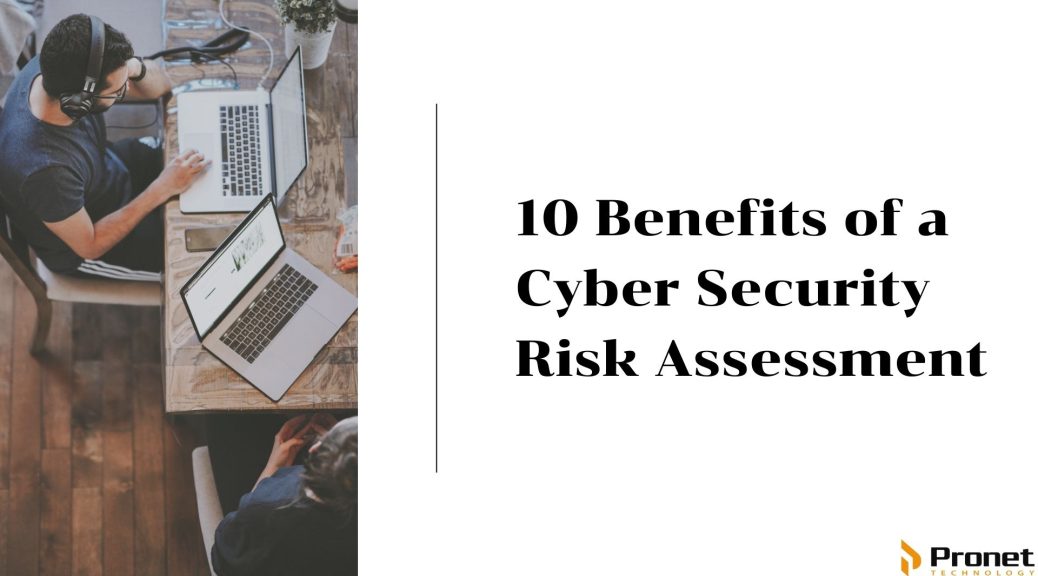10 Benefits of Performing a Cyber Security Risk Assessment

You’re not alone if you feel concerned about the security of your business. In today’s digital age, cyber threats are a constant concern for businesses of all sizes. One way to protect your business is by performing a Cyber Security risk assessment. While it may seem like a chore, especially when you have plenty of other business issues or projects to work on, there are many benefits of conducting a risk assessment, and completing one can actually save your business.
What is a Cyber Security Risk Assessment?
Before we delve into the benefits of a Cyber Security risk assessment, let’s define what it is. A Cyber Security risk assessment is the process of identifying, evaluating and prioritising potential security risks to your business’ technology systems, networks and data. This assessment is crucial in understanding the vulnerabilities of your business’s digital assets and how they could be exploited by malicious actors.
The Benefits of Performing a Cyber Security Risk Assessment
Performing a Cyber Security risk assessment can provide many benefits to your business. Here are 10 of the most significant advantages of conducting a risk assessment:
Identifying Vulnerabilities
A risk assessment can help identify vulnerabilities in your business’s technology systems, networks and data. By identifying these vulnerabilities, you can take proactive steps to mitigate them before they’re exploited by cybercriminals. This also allows you to improve the Cyber Security stance of the business and create a Cyber Security culture within your company.
Prioritising Risks
Conducting a risk assessment can help prioritise risks to your business’s technology systems, networks and data, and allows your business to introduce the appropriate response strategies to the vulnerabilities you have identified. By doing so, you can allocate resources to address the most significant risks first, ensuring that your business is protected where it matters most.

Complying with Regulations
Many industries have regulations that require businesses to perform Cyber Security risk assessments regularly. By complying with these regulations, you can avoid hefty fines and penalties, and safeguard your business from legal troubles. In Australia, all businesses need to comply with The Privacy Act 1988, meaning they need to have some sort of measures in place to protect consumers’ information. For public sector organisations, the Australian Government has also brought in Essential Eight, a Cyber Security framework that they must implement. This is highly recommended for all other businesses in Australia too, and we predict it will be mandated for everyone soon.
Reducing Downtime
Cyberattacks can cause significant downtime for your business, resulting in lost productivity and revenue. Downtime can cause customers to go elsewhere and can cause staff to halt projects or start working manually which they will then have to fix later on when IT issues are resolved. By performing a risk assessment, you can identify potential threats and implement preventative measures to reduce the likelihood of a cyberattack and minimise downtime.
Protecting Your Reputation
A data breach can damage your business’s reputation and erode customer trust. When customers lose trust in your business’ ability to protect their information or even just in your ability to protect yourself, they will stop using your business or bypass your services altogether even if they’ve never used them before. As for stakeholders like suppliers, they may be hesitant to work with an organisation that has suffered a security breach, especially as this will disrupt the rest of the supply chain. By performing a Cyber Security risk assessment and implementing preventative measures, you can safeguard your business’ reputation and show customers that you take their data security seriously.
Improving Security Posture
A risk assessment can help you understand your business’ security position and identify areas for improvement. By addressing these areas, you can improve your business’ overall security posture and better protect against cyber threats in the future. You may find your position is actually better than you thought, giving you the reassurance that your IT team or managed service provider is doing their job and looking after the interests of your business. Overall, a risk assessment allows you to ease your fears about cyberattacks as well as the potential loss of your business.

Keeps Stakeholders Informed
A comprehensive Cyber Security Risk Assessment allows you to keep your stakeholders informed and educated on vulnerabilities as well as allows you to inform them of how you’re going about protecting the business and their interests. It also allows you to provide an executive summary to help executives and directors make informed security decisions.
Reduces Long-Term Costs
A Cyber Security risk assessment allows you to fully understand the justification behind costs being made around security, which, as a business owner or decision-maker, you need to fully comprehend just how important this additional expense is. By knowing the vulnerabilities in your IT systems, you can then spend the proper amount of time and money in fixing these issues and mitigating risks, which will ultimately save your business the costs of downtime and of dealing with cyberattacks when they occur. That’s not to say that they won’t occur even with a fantastic Cyber Security posture, but the majority will be able to be prevented and you should be able to stop the worst of the attack in its tracks when one does. You will also be able to get your business back up and running quickly and seamlessly with data recovery responses.
Prevents Data Loss
Data loss can and has destroyed businesses. It has both financial and emotional impacts on businesses of all sizes, not just large enterprises. This includes stress and anxiety due to losing customer records, financial information and key documents; financial impact surrounding the cost of lost business, lost reputation with customers and suppliers as well as with data recovery and breach response; the impacts surrounding legal consequences of not complying with data protection laws.
Improves Communication
This benefit comes from different avenues. First, a risk assessment requires information from different parts of an organisation, so this improves communication between both leaders and departments. It also breaks down barriers between management and IT staff, whether that be internal and/or external, as it allows the two groups to come together to make decisions that relate to the implementation of security requirements for systems, data and access, while also thinking about the security of the organisation as a whole.
Performing a Cyber Security risk assessment is a crucial step in protecting your business from cyber threats. It allows you to safeguard your business’ digital assets and ensure its long-term success. So, don’t wait until it’s too late. Invest in a Cyber Security risk assessment today and reap the benefits of a secure and successful business.

Frequently Asked Questions
- How often should I perform a Cyber Security risk assessment?
It’s recommended that businesses perform a Cyber Security risk assessment at least once a year or whenever there’s a significant change to their technology systems or infrastructure.
- What are the key components of a Cyber Security risk assessment?
A Cyber Security risk assessment typically includes identifying assets, threats, vulnerabilities and controls. It also involves assessing the likelihood and impact of potential threats and prioritising risks.
- Who should perform a Cyber Security risk assessment?
All businesses need to conduct a Cyber Security risk assessment, not just large enterprises. It’s also recommended that businesses hire a qualified Cyber Security professional to perform this assessment as it ensures the assessment is thorough and accurate and that all potential risks are identified and addressed.
- How long does a Cyber Security risk assessment take?
The length of a risk assessment depends on the size and complexity of the business’s technology systems and infrastructure. Typically, it can take anywhere from a few weeks to a few months to complete a comprehensive risk assessment.
- What happens after a Cyber Security risk assessment?
After a risk assessment is completed, a report is generated that outlines potential risks and recommended actions to mitigate them. The business can then take these actions to improve its overall security posture and protect against cyber threats.
- Is a Cyber Security risk assessment worth the investment?
Absolutely. The benefits of performing a cyber security risk assessment far outweigh the cost. By identifying vulnerabilities and implementing preventative measures, you can protect your business from cyberattacks, reduce downtime, comply with regulations and safeguard your reputation.



